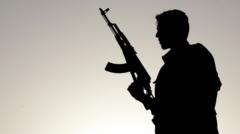How Are Families Coping with the Impact of the 40-Year PKK Conflict?

The Impact of the PKK's Disbandment on Kurdish Families and Regional Politics
Last month, the Kurdistan Workers' Party (PKK) made a significant announcement that has reverberated through the hearts and homes of many families. After decades of insurgency against Turkey, the PKK declared its intention to disband, igniting hope for peace and reconciliation. Yet, for many, including Leila, a mother whose son joined the PKK three years ago, this announcement is bittersweet, filled with mixed emotions and uncertainty.
The PKK, which has been classified as a terrorist organization by Turkey, the United States, the United Kingdom, and the European Union, has been entrenched in a conflict with Turkey for more than 40 years. This long-standing struggle has led to over 40,000 deaths, including countless civilians, making it one of the most protracted conflicts in modern history. As the announcement unfolded, families on both sides of the conflict found themselves grappling with the ramifications.
The Journey of a Mother: Leila's Story
Leila, whose name has been changed for her safety, lives in the semi-autonomous Kurdistan Region of Iraq. Her son, an Iraqi-Kurd in his twenties, left their home to join the PKK, motivated by ideologies he had only recently discovered. Leila describes how her son was gradually "brainwashed" by the PKK, believing that they were fighting for the rights of Kurdish minorities across the region.
Her son’s departure was a pivotal moment for Leila—a mixture of fear and sadness enveloped her as he announced his decision. Despite her attempts to dissuade him, he was resolute. “He was so determined. Arguing with him would have been of no use,” she recalls. Since he left, she has only seen him twice in video messages, the last one being in March.
The Pain of Separation
Leila’s longing for her son is palpable. She has made several trips to the Qandil Mountains, where PKK fighters are often stationed, hoping for a brief reunion. “If they just let me see him once a year, I would be happy,” she says, embodying the heartache faced by many families who have lost their loved ones to this conflict.
The Context of the PKK's Announcement
The PKK's decision to disband was seen as a historical moment for Turkey and the Kurdish minority. It was hoped that this would pave the way for peace talks and a formal ceasefire. However, the realities on the ground reveal a different picture. Reports of ongoing violence continue, and many families are left wondering about the future of their loved ones involved in the conflict.
The Shift in PKK's Ideology
Originally founded to fight for an independent Kurdish state, the PKK has shifted its focus over the years to demand greater cultural and political autonomy for Kurds. This evolution reflects the complexities of Kurdish identity and the various factions that exist within Kurdish society across Turkey, Iraq, Syria, and Iran. The PKK's leadership has consistently argued that their fight is for the rights of all Kurds, not just those in Turkey.
The Voices of the Families
Families affected by the PKK conflict exhibit a wide range of sentiments. While some express anger and resentment towards the PKK, others feel immense pride in their relatives’ sacrifices. Rondek Takoor, whose brother was killed while fighting for the PKK, articulated this duality of emotions. “It’s a moment of pride and pain, especially after our huge loss,” she shares. Rondek believes that the sacrifices made by fighters like her brother were necessary for bringing about a dialogue for peace.
What Lies Ahead?
As the PKK announces its disbandment, questions loom large. What will happen to the thousands of PKK fighters? Will they be reintegrated into Turkish society, or will they face prosecution? The Turkish government has yet to clarify its stance on these issues, leaving many families in limbo. Some reports suggest that fighters who have not committed crimes in Turkey could return without fear of prosecution, while PKK leaders may face exile or restrictions on their movements.
The Regional Implications of the PKK's Disbandment
The implications of the PKK's disbandment extend beyond Turkey. The Kurdish communities in Syria, particularly the People's Protection Units (YPG), have been a focal point of conflict in the region. Turkey has long regarded the YPG as an offshoot of the PKK and has launched military operations against them. While the YPG insists it is a distinct entity, the Turkish government remains unconvinced.
Turkish President Recep Tayyip Erdogan's statements following the PKK's announcement have suggested a willingness to negotiate, but skepticism remains. Observers note that Erdogan may see an opportunity to garner Kurdish support for a new constitution aimed at consolidating his power. However, the peace process requires genuine commitment from all parties involved, including the PKK and the Turkish government.
Challenges Ahead for Kurdish Groups
Other Kurdish groups, such as the Party of Free Life of Kurdistan (PJAK) in Iran, have expressed support for a peaceful resolution but have no plans to disarm. The complexities of regional politics mean that any peace initiative involving the PKK will inherently affect the dynamics of Kurdish groups across the Middle East.
Conclusion: A Mother’s Hope
For mothers like Leila, the convoluted politics and military strategies are overshadowed by a simple desire: to have their children return home safely. “He will come back home when he gets tired of the harsh life in the mountains,” she reflects, with a glimmer of hope for the future.
The disbandment of the PKK could very well mark the beginning of a new chapter for Kurdish communities and Turkey. However, it will take concerted effort and goodwill from all parties to navigate the path toward lasting peace. As the dust settles, families continue to hold their breath, waiting for a resolution that will bring their loved ones back.
Frequently Asked Questions
What is the PKK and why is it considered a terrorist organization?
The PKK, or Kurdistan Workers' Party, is a militant political organization founded in the late 1970s, primarily advocating for Kurdish rights in Turkey. It is classified as a terrorist organization by several countries, including Turkey, the US, and the EU, due to its long history of armed conflict and violent actions against the Turkish state.
What led to the PKK's decision to disband?
The PKK's decision to disband stems from a combination of internal and external pressures, including a desire for peace talks with the Turkish government. The group aims to transition from armed conflict to a political solution that recognizes the rights of Kurds.
What are the implications for Kurdish fighters in Turkey and beyond?
The implications for Kurdish fighters are uncertain. Many may face reintegration challenges, while others could be prosecuted. The future of Kurdish political movements in neighboring countries like Syria and Iran also remains unclear.
As families like Leila's await news of their loved ones, the region stands at a crossroads. Will this moment of potential peace lead to reconciliation, or will the complexities of history and politics create new challenges? #KurdishRights #PKK #PeaceProcess
Published: 2025-06-26 23:33:15 | Category: world



